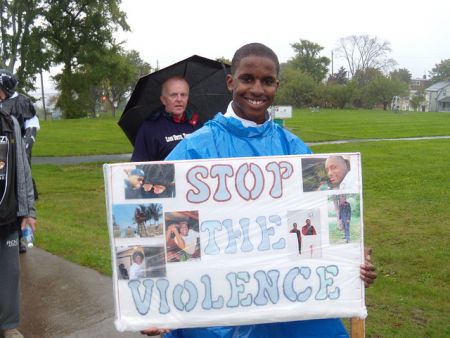The cure for violence starts with a community.
“We view violence as an epidemic,” says Viki Samuels-Stewart, project manager of CeaseFire Halifax Communities — a new outreach program that treats violence as an infectious disease.
CeaseFire, now called Cure Violence, is a model of violence prevention that was developed by a University of Illinois doctor in 2000 as a way to reduce Chicago's rate of gun crimes.
It has since been applied in New York City, N.Y., Baltimore, Md., Boston, Mass., -- even Mexico.
The program brings together community services with outreach workers to stop violence in a three-pronged approach: identify, intervene and help change the behaviours of people who are involved in, or who are seen as at-risk to commit violent crimes.
“We know that Halifax is not Chicago in terms of the level of violence,” Samuels-Stewart said in an interview Wednesday. “But we don’t want it to become like that, nor do we want to become immune to it.”
She said Halifax recently became the first Canadian city to implement CeaseFire, which will be funded by $2.5 million from the federal government over the next five-years.
The program will host a series of community launches starting this month.
During a recent roundtable meeting with other local organizations, CeaseFire outreach coordinator Marcus James explained that the program uses a combination of intervention and community response strategies to stop violence before it escalates.
The goal is to examine the root of why someone turns to violence, then provide the necessary supports a person needs to change their lifestyle.
People will have improved access to education, employment and housing options through partnerships with different community organizations around the city, he says.
Samuels- Stewart sees the program as effective because it confronts violence at the street level. Three outreach workers, known as interrupters, have been placed in five communities: North Halifax (near Uniacke Square), Central Halifax, North Dartmouth (near Churchill Court), North and East Preston — neighbourhoods where violent crime at times has been problematic.
Samuels-Stewart describes how interrupters work as “credible messengers.” They are people who are trusted in these neighbourhoods, either from their previous work experience in the area or from having grown up in the community.
Interrupters are the frontline, she says. They are insiders who anticipate where violence may happen before it erupts, and help people to deal with conflict in restorative ways rather than by picking up a weapon.
But the first and most difficult step is getting people to talk.
“It’s all about building those relationship and trust,” Samuels-Stewart says. “It’s the most important thing … if a person trusts you they are bound to talk to you about their lifestyle.”
The program targets black men between ages 16-24, but she promises no one outside that demographic will be denied support.
“That historical and current disadvantage of the African Nova Scotian community is reflected in the violence because young people don’t have hope,” Samuels- Stewart says.
The deaths of nearly 19 black youth between 2006-2011 as a result of gun violence became the catalyst for different communities to begin the search for a solution, which is when CeaseFire was first considered.
For Constable Robin McNeil, Superintendent of the Halifax Regional Police, it is extremely hopeful that communities are taking a stand against violence and helping to steer their young people away from crime.
“Police can’t be responsible for public safety all by themselves,” he said during an interview Wednesday. “We all have a role in public safety.”
He notes that homicides and other violent crimes in the municipality are on a downward trend. The majority of violent crime that still occurs breaks out between people who know each other, he says.
“But any act of violence is unacceptable to us.”
Halifax had the highest rate of gun-related violent crime of all major Canadian cities in 2012, according to a report Statistics Canada released earlier this year.
In 2013 there were 53 shootings and two gun killings, according to Halifax Police statistics from the spring. As of mid-April, police reported there had been eight shootings and one gun-related homicide this year.
These figures do not reflect updated police numbers.
Ceasefire is set to have its first public launch on June 21 at the George Dixon Centre in north end Halifax.



